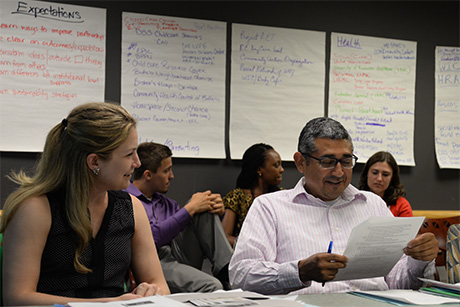New York communities join to help teen parents
By Geoff Preston

Pregnancy changes lives at any age, but it can be especially burdensome if expectant parents are still in high school, when caring for a child can derail their education and career goals.
To improve local resources for expectant and parenting teens and young adults, youth development experts at Cornell’s Bronfenbrenner Center for Translational Research (BCTR) are partnering with community leaders in Buffalo, the Bronx and Rochester on Pathways to Success. The project, which began last year with a four-year grant from the New York State Department of Health to the BCTR’s ACT (Assets Coming Together) for Youth Center for Excellence, supports a network of school district and community college leaders exploring how to assist young mothers and fathers with their child care needs and educational goals.
The community teams met for the first time on Cornell’s campus July 15 to share their discoveries from a needs and resources assessment guided by ACT for Youth staff. The process included focus groups with young people as well as interviews with health and human service providers to identify where their cities succeed and fall short in serving young parents.
“What we’re hoping is for the community partners to look at the findings and determine steps they can take to better support teen parents now that they know what is lacking in their community,” said Jane Powers, ACT for Youth project director. “Today is about developing action plans toward creating change in these communities.”
Pathways to Success puts additional focus on helping teenagers or young adults who want to stay in school do so even if they have a child.
“This project tries to improve outcomes for this population, who are prone to fall through the cracks of our service delivery systems,” Powers said. “Often they don’t finish school and don’t get prenatal care, which can compromise their future health, occupational and economic outcomes.”
ACT for Youth researchers analyzed data gathered by the community teams, identifying cross-cutting themes in each city to guide planning discussions at the campus meeting, according to Amanda Purington, ACT for Youth director of research and evaluation.
In each city, investigators found similar obstacles: Child care is too expensive and often not available; teens lack awareness about available resources; teens often face social stigmas that discourage them from seeking help; and existing systems are inefficient.
By meeting’s end, school district and community college teams had discussed steps to address these shortages. The ACT for Youth team, part of the College of Human Ecology, will continue to provide training, technical assistance, evaluation and data collection support to the community partners. By involving community partners from the start, Powers said, the project is grounded in the specific needs of each city.
“This is an example of how we engage the community in the research process,” she said. “It shows how Cornell, a land-grant university, works with communities in the state to generate knowledge that will be useful to them. There’s a real engagement with the findings because it’s coming out of their community.”
Geoff Preston is a communications assistant for the College of Human Ecology.
Media Contact
Get Cornell news delivered right to your inbox.
Subscribe